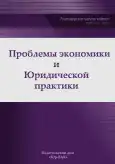Digitalization through the Principles of Legal Proceedings (In Civil and Arbitration Process)
- Authors: Rusakova E.P.1, Zaytsev V.V.1
-
Affiliations:
- Рeoples Friendship University of Russia (RUDN University)
- Issue: Vol 18, No 4 (2022)
- Pages: 105-109
- Section: Articles
- URL: https://journal-vniispk.ru/2541-8025/article/view/147193
- ID: 147193
Cite item
Abstract
Full Text
##article.viewOnOriginalSite##About the authors
Ekaterina P. Rusakova
Рeoples Friendship University of Russia (RUDN University)
Email: rusakova-ep@rudn.ru
Dr. Sci. (Law), Associate Professor Moscow, Russian Federation
Viktor V. Zaytsev
Рeoples Friendship University of Russia (RUDN University)
Email: vickt.zayczev2012@yandex.ru
Юридический институт Moscow, Russian Federation
References
- Gritsenko E. V., Yaluner Yu. A. The right to judicial protection and access to court in the conditions of informatization and digitalization: the significance of the experience of common law countries for Russia // Comparative Constitutional Review. 2020. № 3. P. 97-129.
- Ermakova E. P., Frolova E. E. Artificial intelligence in civil proceedings and arbitration: the experience of the USA and China. Monograph. Yurlitinform Publishing House, 2021. Page 224.
- Zazulin A. I. Positive and negative views on the digitalization of law: in search of an objective point of view // Law and order: history, theory, practice. 2022. No. 1 (32). P. 6-12.
- Zarubina M. N., Pavlov A. A. On procedural realities and potential possibilities of using electronic evidence in the civil process // Bulletin of Civil Procedure. 2019. N 1. P. 205-222.
- Kachalova O. V. European standards for the use of information technologies in legal proceedings in the context of modern challenges and threats // The Rule of law: theory and practice. -2022. -No. 1. -P. 101-115.
- Mehrabyan S. A. National and international aspects of regulatory regulation of the principle of equality of the parties in the framework of the claim proceedings // Bulletin of the V. N. Tatishchev Volga State University. 2022. P. 248-257.
- Ovchinnikova O. V. Prospects for the use of artificial intelligence in pre-trial proceedings // Law and order: history, theory, practice. 2022. No. 1 (32). P. 89-93.
- Osokina G. L. Principles of civil, arbitration and administrative proceedings: comparative legal aspect // Bulletin of Tomsk State University. Right. 2022. No. 43. P. 140-150.
- Pozdnyakova T. S. Problems of realization of citizens' rights to receive free legal aid in different subjects of the Russian Federation // Bulletin of Surgut State University. 2022. No. 2 (36). P. 103-110.
- Rusakova E. P. Integration of modern digital technologies in the judicial proceedings of the People's Republic of China and Singapore // State and Law. 2020. No. 9. P. 102-109.
- Rusakova E. P., Gronik I. A., Kupchina E. V. Civil proceedings through the prism of digitalization: the experience of Russia, the USA and the Philippines // Textbook. Ed. Peoples' Friendship University of Russia (RUDN). 2021. p. 109.
- Sannikova L. V., Kharitonova Y. S. Transformation of law in the digital age: a look into the future // State and Law. 2019. N 9. P. 87-96.
- Rusakova E. P. Robotization of civil proceedings: reality or future // Smart innovation, systems and technologies. 2022. Vol. 288. P. 211-217.
- Rusakova E. P. Frolova, E. E. Guidelines for the beginning of civil proceedings in the era of the fourth industrial revolution // Advances in research on russian business and management. 2022. P. 191-198.
- Frolova, E. E., Rusakova E. P. Trends in the Development of Alternative Ways of Dispute Resolution of Neo Industrialization Subjects // Modern Global Economic System: Evolutional Development vs. Revolutionary Leap: Institute of Scientific Communications Conference. -Cham: Springer Nature, 2021. -P. 1842-1849.
Supplementary files








